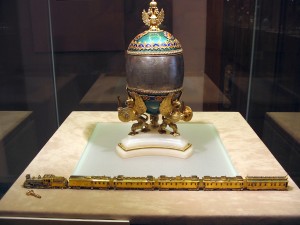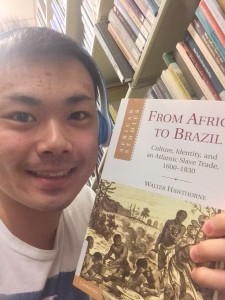Trans Siberian Railway Egg was made by Peter Carl Faberge’s firm in 1900 as a gift from the last Russian Tsar Nicholas II to his wife Alexandra for Easter of 1900. It can be found at the Kremlin Armory Museum in Moscow.
Bibliography
Lowes, Will, and Christel Ludewig McCanless. Fabergé Eggs: A Retrospective Encyclopedia. Lanham, MD: Scarecrow, 2001. Print.
“History of the Trans Siberian Railway.” Trans Siberian Express. Web. 31 Mar. 2015. <http://www.transsiberianexpress.net/trans-siberian-railway-history.html>.
“The World of Faberge.” Moscow Kremlin Museums. Web. 30 Mar. 2015. <http://www.kreml.ru/en-Us/exhibitions/exhibitions-abroad/mir-faberzhe-vena-khudozhestvenno-istoricheskiy-muzey/>.
“Trans-Siberian Railroad”. Encyclopædia Britannica. Encyclopædia Britannica Online.
Encyclopædia Britannica Inc., 2015. Web. 30 Mar. 2015
<http://www.britannica.com/EBchecked/topic/602319/Trans-Siberian-Railroad>.
Intro Music
Dempagumi.inc. Bari3 Republic Edited Version. Tamaya 2060%, 2014. MP3.
Ending Music
Eri Sugai. I’ll Be There. Katsuo Ohno, 1999. MP3.


